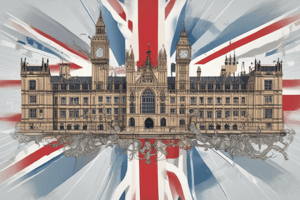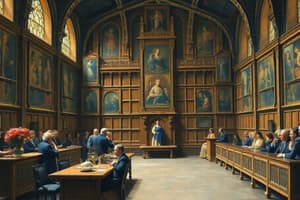Podcast
Questions and Answers
Who is responsible for maintaining order during debates in the House of Lords?
Who is responsible for maintaining order during debates in the House of Lords?
- Lord Speaker (correct)
- Member of Parliament (MP)
- Prime Minister
- Lords Spiritual
What is the role of the Lords Spiritual in the House of Lords?
What is the role of the Lords Spiritual in the House of Lords?
- They are government ministers.
- They represent the public in Parliament.
- They are bishops from the Church of England. (correct)
- They are hereditary peers.
What is the purpose of the Queen's Speech?
What is the purpose of the Queen's Speech?
- To outline the government's legislative agenda. (correct)
- To declare the state of the nation.
- To appoint new bishops.
- To announce the new Prime Minister.
Which document is a formal approval by the monarch making a bill into law?
Which document is a formal approval by the monarch making a bill into law?
Who typically leads the Shadow Cabinet?
Who typically leads the Shadow Cabinet?
Which of the following best describes the UK's political system?
Which of the following best describes the UK's political system?
What is the function of a Whip in Parliament?
What is the function of a Whip in Parliament?
Which title refers to non-clerical members of the House of Lords?
Which title refers to non-clerical members of the House of Lords?
What is an Act of Parliament?
What is an Act of Parliament?
Which of the following best defines 'Backbenchers'?
Which of the following best defines 'Backbenchers'?
What is the role of the Cabinet in the UK government?
What is the role of the Cabinet in the UK government?
What is meant by an 'Unwritten Constitution'?
What is meant by an 'Unwritten Constitution'?
What was the significance of the Glorious Revolution?
What was the significance of the Glorious Revolution?
Who or what does 'The Crown' symbolize in the UK?
Who or what does 'The Crown' symbolize in the UK?
Which Parliament body comprises appointed and hereditary members?
Which Parliament body comprises appointed and hereditary members?
What is a Life Peer?
What is a Life Peer?
Flashcards
Lord Speaker
Lord Speaker
The presiding officer of the House of Lords, responsible for maintaining order during debates.
Lords Spiritual
Lords Spiritual
Bishops from the Church of England who sit in the House of Lords.
Lords Temporal
Lords Temporal
Non-clerical members of the House of Lords, including hereditary and life peers.
Member of Parliament (MP)
Member of Parliament (MP)
Signup and view all the flashcards
Minister
Minister
Signup and view all the flashcards
Royal Assent
Royal Assent
Signup and view all the flashcards
Shadow Cabinet
Shadow Cabinet
Signup and view all the flashcards
The Speaker (of the House)
The Speaker (of the House)
Signup and view all the flashcards
Act of Parliament
Act of Parliament
Signup and view all the flashcards
Amendment
Amendment
Signup and view all the flashcards
Backbenchers
Backbenchers
Signup and view all the flashcards
Bill – Public Bill
Bill – Public Bill
Signup and view all the flashcards
Buckingham Palace
Buckingham Palace
Signup and view all the flashcards
Cabinet
Cabinet
Signup and view all the flashcards
Commonwealth (20th century)
Commonwealth (20th century)
Signup and view all the flashcards
Constituency
Constituency
Signup and view all the flashcards
Study Notes
UK Parliament & Government
- Act of Parliament: Law passed by the UK Parliament (House of Commons, House of Lords, Royal Assent)
- Amendment: Formal change to a law or bill
- Backbenchers: MPs without government/opposition frontbench roles
- Bill (Public): Proposal for new law/change to existing law, introduced in Parliament
- Bill of Rights (1689): Limits monarchy power, affirms parliamentary rights.
- Buckingham Palace: Official residence of the British monarch.
- Cabinet: Senior government ministers, chosen by the Prime Minister, head government departments.
- Commonwealth (20th century): Political association of former British colonies.
- Constituency: Geographical area represented by an MP in the House of Commons.
- Constitution (Unwritten): Principles and laws defining government structure; based on statutes, conventions, history.
- Constitutional Monarchy: Monarchy with limited powers by law/constitution.
- Convention: Established practices/customs; not legally binding, but influential.
- The Crown: The monarchy, symbolizing the state.
- Division (Aye/No lobby): Parliamentary vote, MPs vote in lobbies.
- Glorious Revolution (1688): Overthrow of King James II, strengthening Parliament.
- Hereditary Peer: Aristocrat inheriting title/seat in the House of Lords.
- House of Commons: Elected lower house of UK Parliament, debates/passes most legislation.
- House of Lords: Upper house, appointed/hereditary members (life peers, bishops).
- Lady Diana: Princess Diana, known for charity work.
- Life Peer: Title for lifetime, not inherited, typically appointed by the monarch.
- Lord Speaker: Presides over House of Lords, maintains order.
- Lords Spiritual: Church of England bishops in the House of Lords.
- Lords Temporal: Non-clerical members of the House of Lords.
- Member of Parliament (MP): Elected representative in the House of Commons.
- Minister: Government member heading a department/function.
- Queen Elizabeth II: Monarch of the UK (1952-2022).
- Queen's Speech: Monarch's speech at State Opening of Parliament, outlines government's legislative agenda.
- Question Time: Parliamentary session, MPs question government ministers.
- Parliament/Westminster: Supreme legislative body; located in Westminster, London.
- Peerage/Peer: Title of nobility, confers privileges/responsibilities (House of Lords).
- Prime Minister: Head of UK government, usually leader of majority party.
- Prince Charles: Heir apparent, later King Charles III.
- Prince William: Son of Prince Charles, second in line to the throne.
- Royal Assent: Monarch's formal approval of a bill, making it law.
- Shadow Cabinet: Senior opposition MPs, scrutinize/provide alternatives to government policy.
- The Speaker (of the House): Presides over House of Commons debates, maintains order.
- State Opening of Parliament: Ceremonial event marking the start of parliamentary session.
- Two-Party System: Political system dominated by two major parties (e.g., Conservative/Labour).
- Whip: MP/House of Lords member ensuring party discipline, voting instructions.
- White Paper: Government document outlining proposals for future policy/legislation.
- Windsor Castle: Official residence of the British monarch.
Key Concepts: Definitions
- Key Concepts: Words and terms detailed above.
Studying That Suits You
Use AI to generate personalized quizzes and flashcards to suit your learning preferences.




